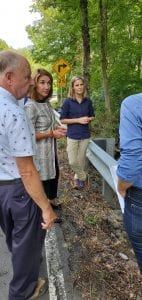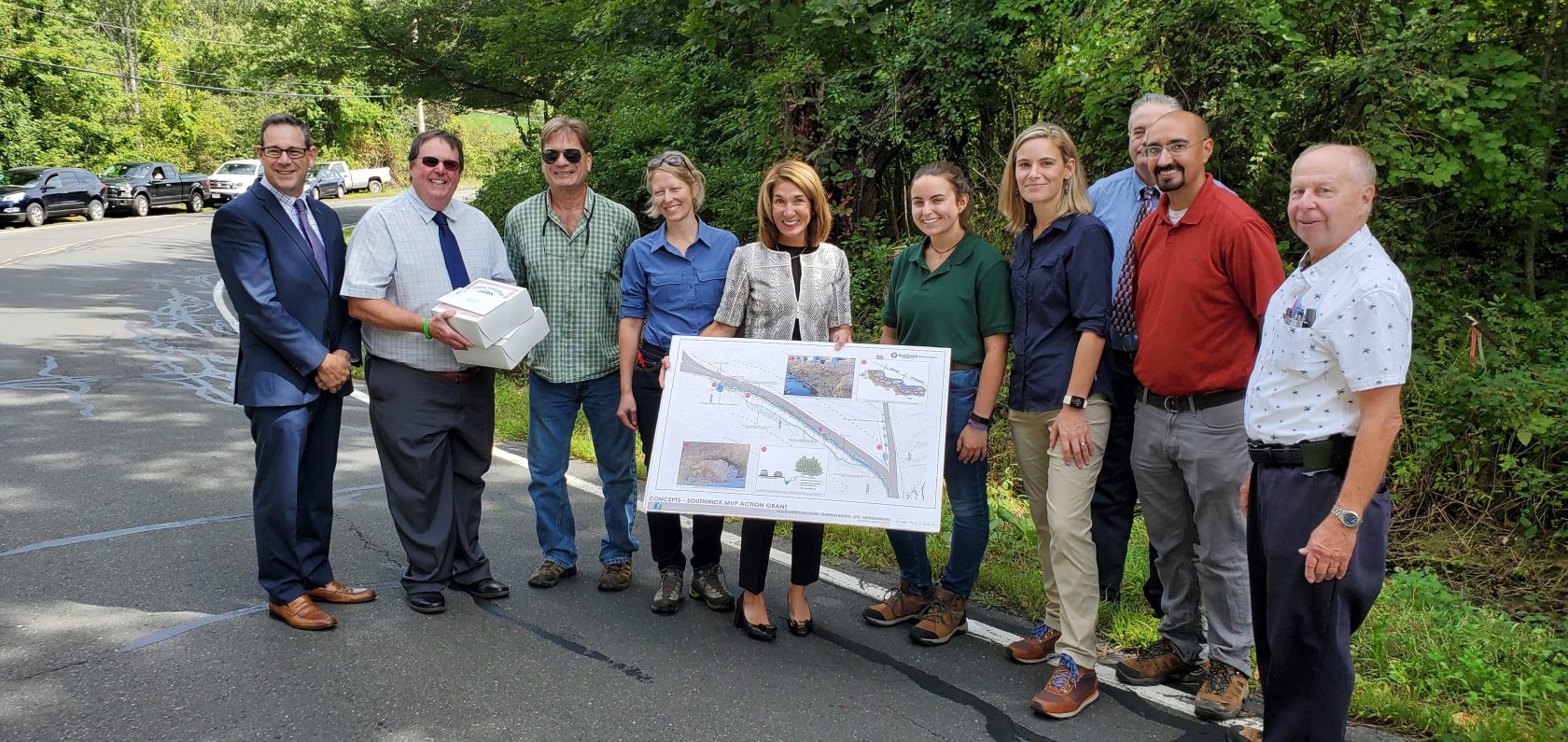
Southwk DPW Special Assistant Richard Grannells, Lt. Gov. Karyn Polito and Energy and Environmental Affairs Secretary Kathleen Theoharides listen as Julianne Busa shows some of the erosion on the edge of Klaus Anderson Road. (Photo by Peter Currier)
SOUTHWICK- Lt. Gov. Karyn Polito and Energy and Environmental Affairs Secretary Kathleen Theoharides joined local officials for a tour of the Klaus Anderson Road and Johnson Brook Culvert Project Thursday.
The culvert is one of about 25,000 in the state that is in need of repairs due to the effects of climate change taxing infrastructure. The Baker-Polito administration awarded Southwick a $138,000 grant for the design and permitting phases of the project.
The grant was given through the Municipal Vulnerability Preparedness (MVP) Program. Further grants for the actual implementation and construction of the culvert project may be awarded as well. The grants are matching, with the receiving community expected to contribute 25 percent. The community’s contribution can also be in kind via working staff hours.
The short bridge on Klaus Anderson Road has been recently prone to flooding, a phenomenon that some town officials who grew up in Southwick said did not happen when they were younger. The cause was attributed to the more frequent and intense weather events that have been happening in the region in recent years. The extra water has also been eroding the sides of the road in some places.
“We’re looking for a variety of restoration ideas to allow the stream to have more room to move back and forth,” said Julianne Busa, senior environmental scientist for Fuss and O’Neill, an environmental consulting firm.
Busa presented a plan that would allow the water to spread out and erode less soil in times of increased waterflow such as after a major storm. Another method of preventing the roadside erosion is to take trees and replant them so that the large roots stick out the side of the stream slightly, which would limit erosion.

Lt. Governor Karyn Polito (center) is flanked by local and state officials while holding the project plan that was presented to her Thursday. The road was temporarily blocked off for the tour. (photo by Peter Currier)
They may also choose to create additional stream channels. As the water rises in the current channels, it would spill over into the second channel, also decreasing erosion.
Polito and Gov. Charlie Baker’s administration is backing a bill in the Massachusetts legislature that would provide $130 million annually to communities in the state that may be vulnerable to the effects of climate change. The funds provided by the bill could be used to make similar infrastructure improvements to that of the Johnson Brook Culvert.
The bridge on Klaus Anderson Road that goes over Johnson Brook would have to be completely replaced. The length of the new bridge will have to be at least 1.2 times the width of the stream below it.
“That allows for better aquatic passage and better hydraulic capacity, so the water won’t be constricted.” Said Busa.
Polito said that the administration would like to see the program expand significantly.
“We know that climate change is having impacts on infrastructure, an aging infrastructure at the same time. Those both together are causing a lot of problems like this,” said Polito, “That’s why we created the MVP program. But we’re working with the legislature to pass our bill which would create a dedicated funding stream, about $130 million yearly . . . to fund infrastructure projects like this to build into the resiliency features and to update the infrastructure.”
Polito added that 249 of the 351 municipalities in the state are involved in the MVP program in some capacity.
Busa said that the permitting process for the project will begin in October or November.
Peter Currier can be reached at [email protected].







